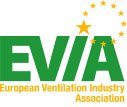What is EVIA?
The European Ventilation Industry Association (EVIA) was established in Brussels in July 2010. EVIA’s mission is to represent the views and interests of the ventilation industry and serve as a platform between all the relevant European stakeholders involved in the ventilation sector, such as decision-makers at the EU level as well as our partners in EU Member States. Our membership is composed of more than 45 member companies and 6 national associations across Europe, realising an annual turnover of over 7 billion euros and employing more than 45,000 people in Europe.
EVIA aims to promote highly energy efficient ventilation applications across Europe, with high consideration for health and comfort aspects. Fresh and good indoor air quality is a critical element of comfort and contributes to keeping people healthy in buildings.
Mission & Vision
The European Ventilation Industry Association advocates for the development and implementation of sustainable, energy efficient ventilation solutions that enhance indoor air quality in buildings, promoting a healthier and more circular built environment.
We envision a world where every individual has access to healthy indoor air, fostering well-being and productivity in every living and working space.
What does EVIA advocate?
EVIA aims to promote highly energy efficient ventilation applications across Europe, with high consideration for health and comfort aspects. Fresh and good indoor air quality is a critical element of comfort and contributes to keeping people healthy in buildings.
EVIA takes the view that the ventilation sector can contribute to the energy efficiency targets set by the EU. Heat recovery in ventilation systems for instance can result in avoiding large heat losses in buildings and therefore contribute to the overall energy performance of a building.
What does EVIA do?
- Promote high indoor air quality and energy recovery through quality solutions (products and installation) at European and national levels;
- Promote the idea that recovered energy is at least as environment-friendly as renewable energies and that recovered energy deserves equivalent consideration in EU policies;
- Secure that regulations will take the quality aspect of ventilation systems including their installation into account;
- Spread best practices regarding design, installation and maintenance;
- Support suitable training curriculum and quality insurance for installations throughout Europe;
- Support a harmonisation of local product approval processes towards common European standards.
Why does EVIA focus on energy efficiency and eco design?
Buildings account for approximately 40%of the EU’s overall energy consumption and for 36 percent of the EU’s overall emissions of greenhouse gas. Good ventilation can lower the energy costs and therefore offer significant cost savings to individuals, as well as companies and governments. For example, households can save up to 30% of their heating costs by using energy-efficient ventilation products – products that reuse the heat contained in waste air. In order to advocate for more energy efficiency, EVIA calls on policy makers to promote renewable energy sources in the EU, recognize heat recovery technology as a form of renewable energy, and to push for the reduction of energy consumption of buildings.
Why focus on Indoor Air Quality?
Europeans spend 90% of their time indoors where pollutant levels are often much higher than those found outside. In fact, the indoor air in our homes, schools, offices and factories can be twice, or even five times, more polluted than outdoor air. In some more extreme cases, indoor air has been found to be a hundred times more polluted than its outdoor equivalent. Exposure to indoor pollutants, mainly as a result of everyday products and activities, is the key contributor to asthma and the spread of most infections and allergies. Air quality also affects how we learn and how we work. Studies show that at schools students perform some 15% better when the ventilation rate is doubled. At Work: With improved air quality, workers can be at least 10% more productive. Good ventilation is thus critical when it comes to good indoor air quality. Among other things, EVIA therefore calls for stronger norms for indoor air quality and regulations for buildings being renovated.
Who can become an EVIA member?
EVIA’s members are the organization’s lifeline. They have a key role in shaping the strategies and positions of the association on all the regulatory issues that EVIA is following. Currently, EVIA is composed of 44 organizations representing the European ventilation industry: 38 companies and six associations. Organizations that would like to become a member of EVIA should submit their application to the EVIA Secretariat. They will be considered a full member after being approved by the steering committee and having paid their membership fee.
What types of ventilation products does EVIA represent?
The products EVIA represents can be grouped into three categories: residential, non-residential, and fans.
- Residential ventilation products range from a very simple fan in a home to a high-tech ventilation system serving an entire apartment building.
- Non-residential ventilation not only include larger non-residential buildings such as schools, offices and stadiums, but also trains, planes, and busses.
- Fans are found in supermarkets, schools, hospitals, among other places to clean the air we breathe, to cool buildings and to prevent the spread of bacteria.
While EVIA specifically focusses on ventilation, other organizations group other forms of indoor climate control organizations such as EPEE and ARENA that represent the refrigeration, air conditioning and heat pump (RACHP) industry or Eurovent that focusses on indoor climate (HVAC), process Cooling, and food cold chain technologies.
Brochure
Download EVIA – How to get your national association’s voice heared in the EU?

